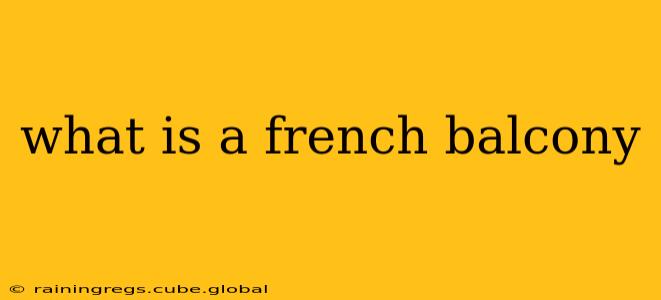A French balcony, also known as a Juliette balcony, is a charming architectural feature that adds elegance and a touch of European flair to a building. But what exactly is a French balcony? It's not a full balcony in the traditional sense, offering a captivating blend of style and practicality that many homeowners covet. This guide will delve into the details, answering common questions and exploring the pros and cons of incorporating this unique design element into your home.
What is the Difference Between a French Balcony and a Regular Balcony?
The key difference lies in its size and functionality. A regular balcony provides a substantial outdoor space, typically large enough to accommodate furniture and allow for comfortable standing or even walking around. In contrast, a French balcony is essentially a decorative railing or balustrade built directly outside a window or door, offering a small, typically narrow, platform that's generally only large enough to stand on. It projects outward minimally, often only a few inches. There's no space for chairs, plants, or other items; its primary purpose is aesthetic enhancement and a limited view.
What are French Balconies Made Of?
The materials used for French balconies are varied and depend on the overall architectural style of the building. Common materials include:
- Metal: Wrought iron, steel, and aluminum are popular choices, offering durability and a classic look. Wrought iron, in particular, lends a more ornate and traditional aesthetic.
- Wood: Wooden French balconies can provide a warmer, more natural feel, though they require more maintenance to prevent rot and decay.
- Stone or Concrete: These materials offer exceptional durability but can be more expensive and heavier.
Are French Balconies Safe?
The safety of a French balcony is paramount. A well-constructed French balcony, installed to building codes, is generally safe. However, care must be taken, especially with children. The small size means there's limited space, increasing the risk of falls. Regular inspections and proper maintenance are essential to ensure the continued safety of the balcony.
How Much Does it Cost to Install a French Balcony?
The cost of installing a French balcony varies considerably depending on several factors, including:
- Materials: The chosen material (metal, wood, stone) significantly impacts the cost.
- Labor: The complexity of the installation and the location will influence labor costs.
- Size and Design: Larger or more elaborate designs will naturally be more expensive.
It's best to obtain several quotes from reputable contractors to get an accurate estimate for your specific project.
Can I Install a French Balcony Myself?
While some DIY enthusiasts might attempt a simple French balcony installation, it's generally recommended to hire a professional. Incorrect installation can compromise safety and structural integrity, potentially leading to costly repairs or even injury. A professional contractor will ensure compliance with building codes and guarantee a safe, aesthetically pleasing result.
Do French Balconies Add Value to a Home?
Adding a French balcony can enhance a property's curb appeal and overall aesthetic value. Whether it significantly increases the home's market value depends on various factors including location, the quality of the installation, and the overall condition of the property. While it might not dramatically boost the resale price, it can certainly make a home more attractive to potential buyers.
What are the Pros and Cons of a French Balcony?
Pros:
- Enhanced Curb Appeal: Adds a touch of elegance and charm to a building's exterior.
- Increased Natural Light: Allows more light into the room.
- Improved Ventilation: Provides a way to ventilate the room without opening a window fully.
- Relatively Affordable: Compared to a full-sized balcony, a French balcony is generally more budget-friendly.
Cons:
- Limited Functionality: Offers very little usable space.
- Safety Concerns: Requires careful design and installation to ensure safety.
- Maintenance: Depending on the material, regular maintenance may be necessary.
In conclusion, a French balcony offers a unique blend of aesthetic appeal and practicality. Understanding its characteristics, costs, and limitations is crucial before deciding if it's the right addition to your home. Careful consideration of safety and professional installation are paramount to ensuring a successful and beautiful addition to your property.
